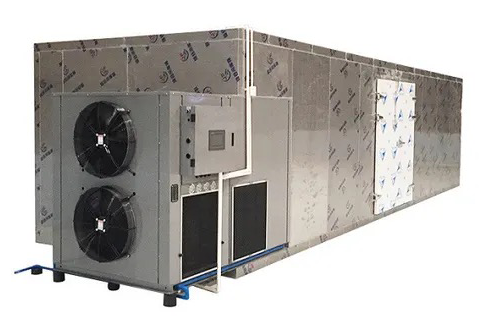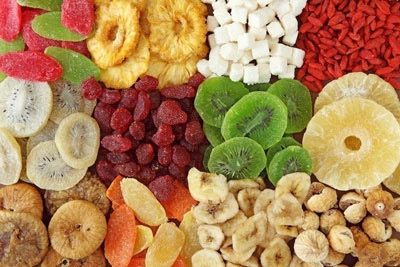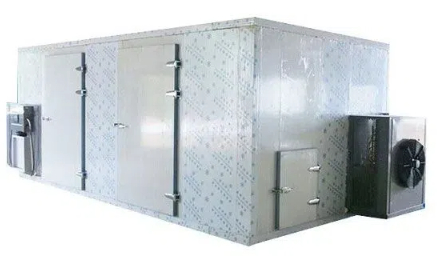
Content Menu
● Understanding Heat Pump Dryers
● Key Advantages of Heat Pump Dryers
● Applications in Food Drying
● Environmental Impact
● Choosing the Right Heat Pump Dryer
● Conclusion
● FAQ
>> 1. What is a heat pump dryer?
>> 2. How does a heat pump dryer save energy?
>> 3. Can I use a heat pump dryer for food drying?
>> 4. Are heat pump dryers easy to install?
>> 5. What maintenance do heat pump dryers require?
● Citations:
Heat pump dryers have emerged as a revolutionary solution in the world of laundry appliances, offering numerous benefits over traditional drying methods. This article delves into the advantages of heat pump dryers, particularly in the context of food drying applications, while also addressing their energy efficiency, versatility, and gentle fabric care.

Understanding Heat Pump Dryers
A heat pump dryer operates on a closed-loop system that utilizes a refrigerant to transfer heat. Unlike conventional dryers that expel hot air outside, heat pump dryers recycle warm air to dry clothes or food items. This process not only conserves energy but also ensures that the drying temperature remains lower, which is essential for preserving the quality of delicate fabrics and food products.
The technology behind heat pump dryers involves several key components: the evaporator, compressor, condenser, and expansion valve. The evaporator absorbs moisture from the air inside the dryer, which is then compressed to increase its temperature. This hot air is circulated through the drum to dry the items. After passing through the drum, the air is cooled in the condenser, where moisture is collected and drained away. The cycle continues, making it an efficient drying solution.
Key Advantages of Heat Pump Dryers
- Energy Efficiency: One of the most significant advantages of heat pump dryers is their energy efficiency. They can reduce energy consumption by at least 28% compared to traditional dryers. This efficiency translates into lower electricity bills and a reduced carbon footprint, making them an environmentally friendly choice.
- Gentle on Fabrics: Heat pump dryers operate at lower temperatures, making them less harsh on fabrics. This gentle drying process helps prevent shrinkage and damage to clothing, extending the lifespan of garments. For food drying, this means that nutrients and flavors are better preserved.
- Ventless Operation: Since heat pump dryers do not require external venting, they can be installed in various locations within a home or facility. This flexibility is especially beneficial for those with limited space or in apartment settings where venting is impractical.
- Cost Savings: Although the initial investment for a heat pump dryer may be higher than that of conventional models, the long-term savings on energy bills can be substantial. Over time, homeowners can recoup their investment through reduced utility costs.
- Versatile Applications: Beyond laundry, heat pump technology is increasingly being used in food dehydrators. These appliances can efficiently dry fruits, vegetables, and meats while maintaining flavor and nutritional content.
- Low Maintenance Requirements: Heat pump dryers typically require less maintenance than traditional dryers because they do not have vents that can accumulate lint and debris. Regular cleaning of filters is usually sufficient to keep them operating efficiently.
Applications in Food Drying
Heat pump dryers are particularly advantageous for food processing industries and home users looking to dehydrate fruits and vegetables. The controlled environment provided by these dryers allows for:
- Preservation of Nutrients: The lower drying temperatures help retain vitamins and minerals in fruits and vegetables compared to higher-temperature methods. For instance, studies have shown that traditional drying methods can lead to significant nutrient loss in foods such as spinach and broccoli.
- Enhanced Flavor Profiles: Foods dried using heat pump technology often exhibit better flavor retention due to the gentle drying process. This preservation of flavor is crucial for consumers who value taste in their culinary experiences.
- Extended Shelf Life: Dehydrated foods have a longer shelf life, making them ideal for storage and transportation. By removing moisture effectively without compromising quality, heat pump dryers enable producers to offer products that remain fresh longer.
- Food Safety: Proper drying techniques are essential for preventing microbial growth in foods. Heat pump dryers can achieve consistent drying conditions that minimize this risk, ensuring that dehydrated products are safe for consumption.
Environmental Impact
The environmental benefits of using heat pump dryers extend beyond energy savings. By reducing energy consumption significantly compared to traditional electric or gas dryers, these appliances contribute to lower greenhouse gas emissions. Additionally:
- Sustainable Practices: Many manufacturers are focusing on sustainable practices when producing heat pump dryers. This includes using recyclable materials and designing products that last longer.
- Reduction of Waste: By prolonging the shelf life of dried foods and minimizing spoilage during storage and transport, heat pump dryers help reduce food waste—a critical issue in today's society.

Choosing the Right Heat Pump Dryer
When considering a heat pump dryer for your home or business, several factors should be taken into account:
- Capacity: Assess your drying needs based on household size or production volume if used in commercial applications. Heat pump dryers come in various capacities to accommodate different requirements.
- Features: Look for models with advanced features such as moisture sensors, multiple drying programs, and smart technology integration that allows remote monitoring and control via smartphone apps.
- Energy Ratings: Check energy efficiency ratings before purchasing. Higher-rated models may have a higher upfront cost but will save more on energy bills over time.
- Brand Reputation: Research brands known for reliability and customer service. Reading reviews from other users can provide insights into performance and durability.
Conclusion
In summary, heat pump dryers offer numerous advantages that make them an excellent choice for both laundry and food drying applications. Their energy efficiency, gentle fabric care, versatility in installation, cost savings over time, low maintenance needs, and positive environmental impact position them as a superior alternative to conventional drying methods. As more consumers become aware of these benefits, the popularity of heat pump technology is expected to grow significantly.

FAQ
1. What is a heat pump dryer?
A heat pump dryer is an appliance that uses a closed-loop system to recycle warm air for drying clothes or food items without venting hot air outside.
2. How does a heat pump dryer save energy?
Heat pump dryers save energy by reusing heated air instead of generating new heat continuously, leading to reduced electricity consumption compared to traditional dryers.
3. Can I use a heat pump dryer for food drying?
Yes, heat pump dryers are effective for food drying as they operate at lower temperatures that preserve nutrients and flavors in fruits and vegetables.
4. Are heat pump dryers easy to install?
Yes, heat pump dryers are ventless and can be installed in various locations without the need for extensive ductwork or external venting.
5. What maintenance do heat pump dryers require?
Heat pump dryers require regular cleaning of filters to maintain efficiency but generally have lower maintenance needs compared to conventional models.
Citations:
[1] https://www.familyhandyman.com/article/heat-pump-dryer/
[2] https://www.beko.co.uk/lifestyle/benefits-of-a-tumble-dryer-heat-pump
[3] https://www.istockphoto.com/photos/food-dehydrator
[4] https://www.youtube.com/watch?v=mtDzdYoyeR8
[5] https://www.bosch-home.com.sg/experience-bosch/living-with-bosch/fresh-reads/6-reasons-why-you-need-a-bosch-heat-pump-dryer-in-your-life
[6] https://www.dreamstime.com/photos-images/food-dehydrator.html
[7] https://www.youtube.com/watch?v=rR2G5UO-5Ms
[8] https://www.energystar.gov/products/clothes_dryers/heat-pump-dryer
[9] https://www.aztecappliance.com/blog/pros-cons-of-heat-pump-dryer
[10] https://www.savemoneycutcarbon.com/learn-save/heat-pump-tumble-dryers-all-you-need-to-know/











